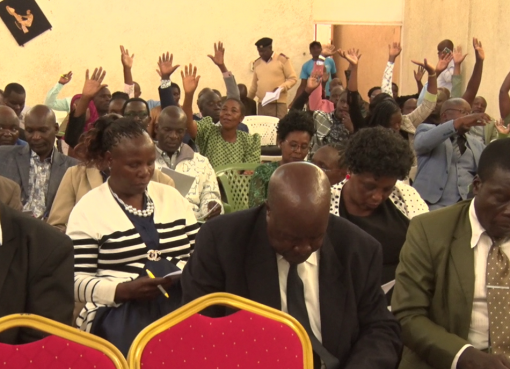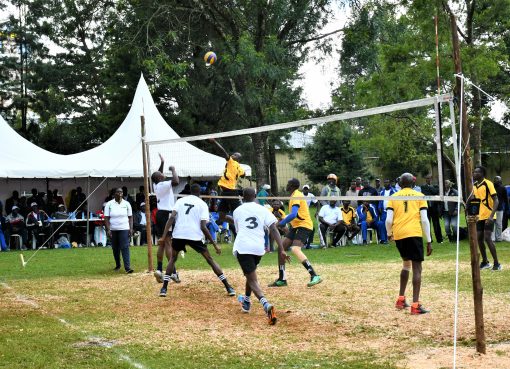Farmers have been advised to be vigilante against getting cheated by unscrupulous traders who have formed rackets that deal in fake seeds and substandard farm inputs.
Nakuru County Executive Committee Member in charge of Agriculture, Livestock and Fisheries Leonard Bor said use of certified seeds and fertilizers contributes towards food security when there is sufficient rainfall.
Mr Bor advised farmers to avoid buying seeds packed in open containers that were not labelled adding that such traders were not licensed by the Kenya Plant Health Inspectorate Service (Kephis) to stock certified seeds.
“Distribution of counterfeit seeds and substandard farm inputs is a big threat to food security. Fake seeds are the leading contributor to poor harvests and low crop production, in the process, triggering increased cost of living through food imports from other countries,” stated the CECM.
Speaking during a meeting with officials from Kenya Seed Company, Nakuru branch, to deliberate on ways of enhancing farmers’ access to quality and certified seeds, Mr Bor asked farmers to be keen on what they purchase and report individuals trading in uncertified seeds.
“Most farmers use counterfeit seeds due to a lack of access to quality certified seeds and information. As such, Governor Susan Kihika’s administration has resolved to partner with the Kenya Seed Company to conduct training and organize farmers’ field days as a measure to tackle the counterfeit seed and poor-quality farm inputs menace,” he disclosed.
The CECM indicated that traceability of certified seeds was easy and advised farmers to keep the packet and receipt as these may be required as evidence in case of suspected fake seeds.
“To succeed in fighting bad seeds, the farmer should check a packet and they will see a Kephis logo. Once they scratch it, they will find a serial number which can be sent to a code that will enable them to tell the exact variety, its producer, the batch and its lifespan. That’s the only way to secure our agriculture. You can’t talk about food security unless you have good quality seeds,” he said.
He added “It is unfortunate that some seed producing companies are notorious for taking advantage of the planting season to sell uncertified seeds to farmers. Farmers should be careful. They should not purchase seeds not certified by Kephis. Most of them don’t germinate while others give poor yields.”
Mr Bor said all certified seed bear a Kephis label and further have a seal indicating the date of production as well as the lifespan.
Planting seasons in Kenya are characterized by high demand for certified seeds against low supply. As a result, shady seed merchants have been taking farmers for a ride by selling them counterfeit seeds. These seeds are packaged in similar packets as those of certified ones.
Although some farmers have good judgement, when it comes to detecting fake seeds, it is never foolproof.
The CECM expressed concern that if the business of fake seeds is allowed to flourish, it will be a threat to the seed industry which loses millions of shillings in potential sales each year.
He told farmers to buy recommended seed varieties for their particular areas as each region had seeds specifically manufactured to suit its climatic conditions.
Mr Bor also advised farmers to allow regular testing of soils to determine the type and quantity of fertilizer to use.
The CECM observed that the Kenya Seed Company offers an extensive portfolio of over 60 certified seed varieties, tailored to diverse agroecological zones within the region. The Company he added, controls over 80 percent of the seed maize market in Kenya.
A few days ago, Kephis Managing Director Professor Theophilus Mutui warned that agrovet dealers found selling fake seeds face a fine of up to Sh1 million and a jail term of up to two years in a new move by the government to get rid of unscrupulous traders in the market.
Professor Mutui said the organization has received complaints from farmers over sale of fake seeds by dealers.
“We have had instances of fake seeds sold in some counties, especially in grain basket regions by unscrupulous traders thus affecting food production. In the recent past we managed to arrest the situation in one of the counties in the Rift region,” he stated.
Mutui added that the inspectorate will be working with the police and other State agencies to flush out unscrupulous individuals trading counterfeit seeds to unsuspecting farmers.
Farmers in some regions have been complaining of sale of substandard seeds, claiming the same is contributing to low food production.
He said Seed and Plant Varieties Act Cap 326 of 2012 stipulates stiff penalties for those arrested dealing in fake seeds which includes a fine of up to Sh1 million and a jail term of up to two years if found guilty.
By Jane Ngugi




